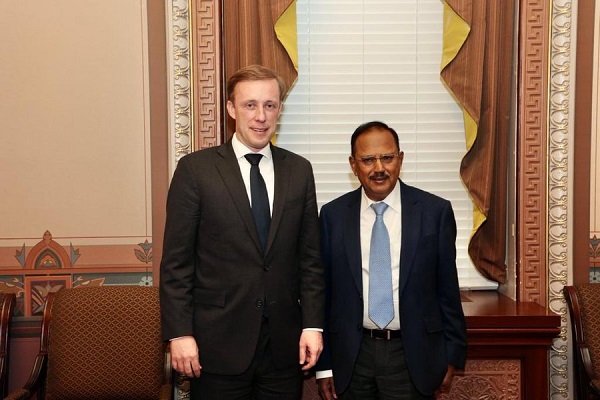
Washington, (Samajweekly) A proposal to jointly produce jet engines in India was among many new discussed and announced at the inaugural meeting of the India-US initiative on Critical and Emerging Technology (iCET) here on Tuesday by the two sides led respectively by their National Security Advisers Ajit Doval and Jake Sullivan.
Talks covered a wide range of cooperation from technologies regarding space — and the training of an Indian astronaut at a US NASA facility and AI to increased cooperation between the scientific establishments of the two countries and US support for India’s efforts to produce semiconductors.
The iCET initiative was announced by Indian Prime Minister Narendra Modi and US President Joe Biden in 2022 May to elevate and expand strategic technology partnership between the two countries and defence industrial cooperation between the governments, businesses and academic institutions.
“The US and India affirm that the ways in which technology is designed, developed, governed and used should be shaped by our shared democratic values and respect for universal human rights,” said a White House factsheet issued on the outcomes of the inaugural meeting.
General Electric (GE), the American engineering giant, has submitted a proposal to the US government to jointly produce jet engines that could power jet aircraft operated and produced indigenously by India, the White House noted, and added that the US government, whose go ahead will be necessary for this kind critical dual-use technology, has committed to an expeditious review of this application.
GE’s major military business centres around the F110 engine in Air Force and export F-15s and F-16s; F404 and F414 engines in the Air Force T-7, Saab Gripen fighter, Navy F/A-18 Super Hornet and Navy EA-18G Growler; and the T408 engine in the Marine Corps CH-53K, according to the Air and Space Forces magazine.
The two sides decided to develop a new bilateral Defence Industrial Cooperation Roadmap to accelerate technological cooperation between both countries for the joint development and production, with an initial focus on munition-related technologies, and other systems, apart from the jet engine.
A new implementation arrangement for a Research Agency Partnership between the National Science Foundation and Indian science agencies was signed to expand international collaboration in a range of areas — including artificial intelligence, quantum technologies, and advanced wireless — to build a robust innovation ecosystem between our countries, the White House said.
The two sides also agreed to set up a joint Indo-US Quantum Coordination Mechanism with participation from industry, academia and government to facilitate research and industry collaboration.
India and the US will also work together to develop common standards and benchmarks for trustworthy AI drawing from global efforts and promote collaboration on High Performance Computing (HPC) — using supercomputers and clusters of computers for high-speed computing.
A key area of cooperation under this new initiative will be semiconductors. The White House fact -sheet said the two countries will enhance “bilateral collaboration on resilient semiconductor supply chains; supporting the development of a semiconductor design, manufacturing, and fabrication ecosystem in India; and leveraging complementary strengths, both countries intend to promote the development of a skilled workforce that will support global semiconductor supply chains and encourage the development of joint ventures and technology partnerships on mature technology nodes and packaging in India”.
Increased cooperation in the area of space will include the training of an Indian astronaut as NASA’s at Johnson Space Centre. The fact-sheet noted the ongoing visit of ISRO Chairman to the US to meet his American counterpart, and a return visit to India by the NASA Head later in the year.







